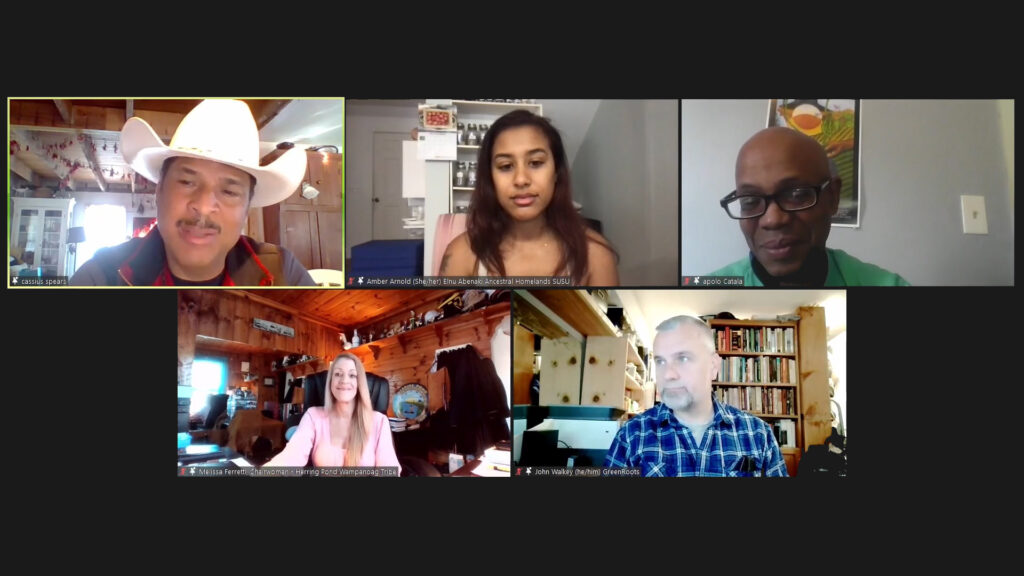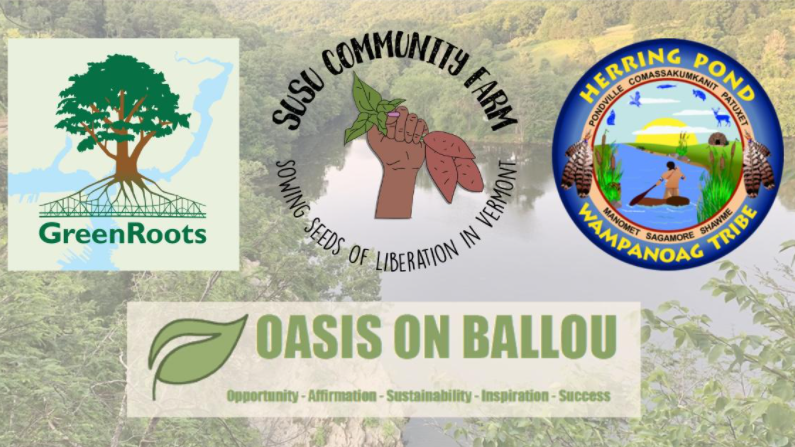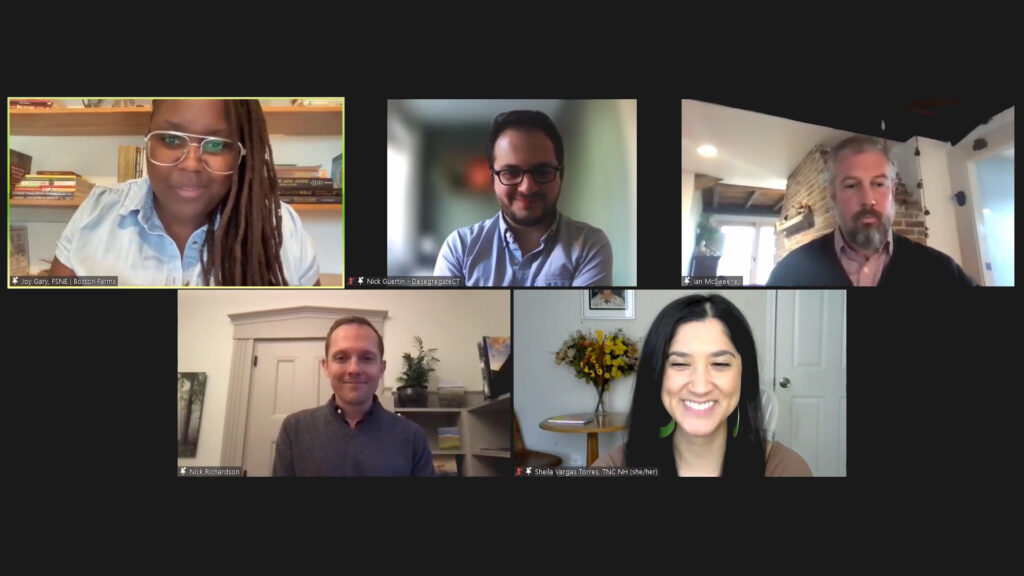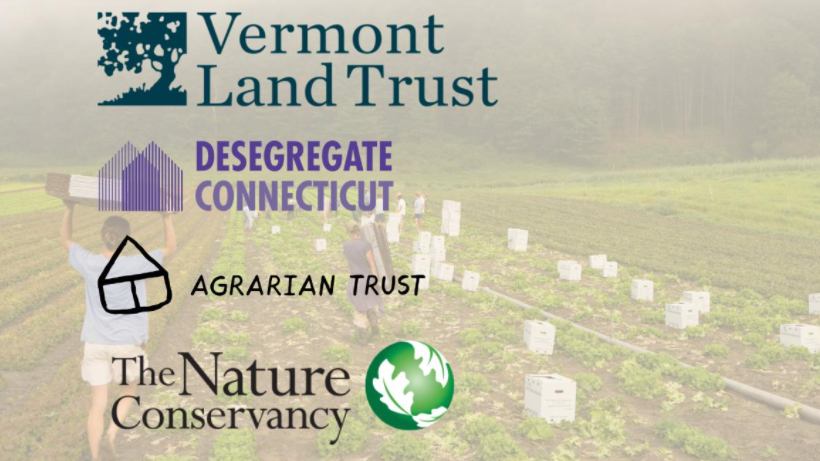More than 300 attendees from across the Northeast and beyond joined conservation and Land Justice leaders on November 18 at the 2021 Regional Conservation Partnership Network Gathering.
Co-hosted by Highstead senior conservationist Bill Labich, and conservationist Katie Blake, the virtual Gathering program consisted of a keynote address and two moderated panel discussions designed to advance past Gathering conversations on equity and Land Justice by raising awareness and understanding of the legacy of racism and white supremacy in conservation, and examining actionable approaches for addressing this history while advancing land conservation goals. Dianne Russell, president of the Institute for Conservation Leadership led breakout sessions for peer connection and learning with a focus on what’s working to advance Land Justice across conservation and environmental organizations.
The Gathering is the product of a coordinated effort of five networks aligned with the broader Wildlands, Woodlands, Farmlands, and Communities vision: The Regional Conservation Partnership (RCP) Network; the Northeast Forest Network; Academics for Land Protection in New England (ALPINE); Food Solutions New England; and the Conservation Finance Network. Leaders from these five networks aided in drafting the event program and panels and in nominating moderators and speakers who brought broadened and essential perspectives to the day.
Keynote Address: Environmental Legacy: Justice, Land Use, and a History of Connection, Parker McMullen Bushman
In her keynote address, Parker McMullen Bushman, chief operating officer of Inclusive Journeys and founder of Ecoinclusive Strategies, outlined a legacy of racism in current environmental disparities and the connections between socio-cultural inequity and environmental issues. Parker drew from her personal history as well as her 24+ years of experience in the non-profit leadership, conservation, environmental education and outdoor recreation fields, and demonstrated why social justice and the environment go hand in hand.
“… I think it’s important for us to understand that people and the land are tied together and when we think about the land, and we think about management of the land, we cannot separate the impacts of people. If you have sick people, you often have sick land, and vice versa.”
Parker McMullen Bushman, Environmental Legacy: Justice Land Use, and a History of Connection at the November 18, 2021 Regional Conservation Partnership Network Gathering
Gathering Panels
Panel I: What Does Land Justice Mean, and How Does it Affect My Communities?
The first panel discussion focused on the history and personal impacts of land injustice, and what justice looks like in the panel’s communities. Speaker geographies encompassed urban and non-urban landscapes and communities, and demonstrated the importance of collaboration in conservation, food and land sovereignty, relationship building, and deep connections to the land.
“When I think about Land Justice I really think about land sovereignty, and when I think about land sovereignty, you know, seeing land as a sovereign being and not as a resource or transactional item, or an object, or something that we can take and own…”
Panelist Amber Arnold, Colaborative Director, SUSU CommUNITY Farm


Moderator: Cassius Spears Sr., Founder/Director, Narragansett Food Sovereignty Initiative at Ashawaug Farm, and member of the Narragansett Indian Tribe
Panelists: Amber Arnold, Collaborative Director, SUSU CommUNITY Farm, Apolo J. Cátala, Farm Manager, Oasis on Ballou Avenue Urban Farm, Melissa Ferretti, Chairwoman and President, Herring Pond Wampanoag Tribe, Plymouth, MA, John Walkey, Director of Waterfront & Climate Justice Initiatives, Greenroots Inc.
Panel II: Guiding Principles for Scaling up Community-Driven Land Justice and Conservation Outcomes
What is working and connecting people to the land and Land Justice? How does change happen, and what does it look like at different scales? How do we get to a deeper sense of humility and get more out of the process to move toward more elements of change? The afternoon panelists met at the intersections of land planning, conservation, community, and health for a discussion on approaches to advancing hyper-local, community-driven Land Justice and conservation efforts.
“We need to think about how to scale out instead of up– and scale-out, meaning meet communities where they’re at in the stage of change that they’re at, and meet them for who they are, and let them lead the work.
Panelist Ian McSweeney, Director, Agrarian Trust


Moderator: Joy Gary, Executive Director, Boston Farms Community Land Trust
Panelists: Nick Guertin, Senior Policy Fellow, Desegregate Connecticut, Ian McSweeney, Director, Agrarian Trust, Nick Richardson, Executive Director, Vermont Land Trust, Sheila Vargas Torres, Government and Community Relations Manager, The NatureConservancy.
2021 New England Leopold Conservation Award® Ceremony
Sand County Foundation and national sponsor American Farmland Trust presented the 2021 New England Leopold Conservation Award® to the Choiniere Family Farm of Highgate Center, Vermont in an afternoon ceremony. Learn more about the Choinieres’ work to improve soil health and erosion control at their dairy farm.
The Leopold Conservation Award celebrates voluntary conservation and provides a prominent platform to recognize farmers, ranchers, and forestland owners as conservation ambassadors. Private landowners are nominated or apply for the award based on their land ethic and ability to showcase that conservation and production have a symbiotic relationship. The region-specific program represents the very best in conservation on private working lands.

“The Choinieres embody so much of the ethos and practice that Aldo Leopold taught and modeled, for generations. I cannot think of a more fitting way to celebrate two inspiring legacies than by recognizing the Choiniere Family Farm with the 2021 Leopold Conservation Award.”
Spencer Meyer, Senior Conservationist, Highstead
Resources
- What inspired you at the Gathering?
- What lessons, ideas, conversations, new partnerships, etc. are you bringing back to your work, organization, RCP, and/or network(s)?
- What action(s) are you already taking or are inspired to take in fostering just, equitable, and resilient landscapes and communities for all?
- Share your ideas and actions at the 2021 RCP Network Gathering Padlet.
To help us get on the same page before the Gathering, we released a story map that provides details on the Gathering and provides stories and context to illustrate the issues of Land Justice in New England.